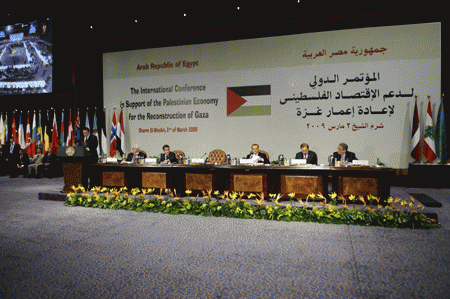On 12 October, Cairo is due to host a conference, sponsored and chaired by Egypt and Norway, of international and Arab donors for the reconstruction of Gaza. This is their ostensible aim. But the reasons that the donors cited for not fulfilling earlier pledges, made in Paris in 2007 and Sharm El-Sheikh in 2009, still exist.
This means that the donors who attend the upcoming Cairo conference will probably make the same pledges they made at the two previous conferences and then once again fail to fulfil them.

Photo taken on March 2, 2009 shows the general view of an international donors' conference to plan the reconstruction of the Palestinian Gaza Strip in Sharm El-Sheikh, Egypt, on March 2, 2009.
(Image by People’s Daily online) Details DMCA
Meanwhile, the Palestinian people under blockade in Gaza will remain in suspense, waiting for the next aggression to be unleashed on them by the Israeli occupation, purportedly in order to eliminate the causes that the donors cite for recycling their pledges for the reconstruction of Gaza that is unlikely to happen in the foreseeable future.
Fulfilment of the donors' old/new pledges is still contingent politically on the imposition of the status quo in the West Bank on Gaza. This entails security coordination with the occupying power, the pursuit and elimination of all forms of resistance to the occupation, rendering all reconstruction activities subject to the approval of the Israeli security regime, and much more.
Even should these conditions be met, the donors' fulfilment of their pledges will remain contingent on the Palestine Liberation Organisation's (PLO) continued commitment to negotiations as its sole strategy, and to the agreements that led to the creation of the Palestinian Authority (PA).
All the evidence indicates that the PLO and the PA have spearheaded the battle to impose the donors' conditions on their behalf. Beneath the rubric of "legitimacy", "the national project" and "the single central authority" that "alone holds the powers to make decisions on war and peace," the PLO and PA have demonstrated that they are ready to abide by the donors' political conditions.
The irony is that Israel has never met the conditions it compelled the donors to impose, not just in order to proceed with the reconstruction of Gaza, but also on the PA in general.
Israel has never renounced violence. It repeatedly wages war and unleashes its instruments of state terrorism against the Palestinians under occupation. It has flagrantly and repeatedly violated every agreement signed with the PLO. It has not even reciprocated the PLO's recognition of Israel, nor has it officially acknowledged the Palestinians' right to establish a Palestinian state.
Currently, the occupation authorities are threatening to dissolve the Palestinian national reconciliation government if it does not assert its full authority over Gaza. The message was driven home by PA Deputy Prime Minister Mohammed Mustafa, who said that there would be no reconstruction unless his government can fully assert its control over Gaza.
However, all the evidence also indicates that the resistance is there to stay in Gaza and that its powers to resist the imposition of the donors' conditions -- on it and on Gaza -- are increasing.
The only possible way to read all of the foregoing, and other facts, is that the reconstruction of Gaza under such conditions and circumstances will be deferred until further notice and that deferring reconstruction and linking it to a process of cloning the West Bank model in Gaza is actually a strategy that paves the way for yet another invasion of Gaza.
It is also a fact that reconstruction needs in Gaza are accumulating as a result of this strategy. Destruction in Gaza did not begin with the response to action against this strategy in 2007. The reconstruction of Gaza's airport and seaport, for example, has been pending since the occupation destroyed these facilities in 2002. Reconstruction dues from the destruction wrought by the Israeli assaults on Gaza in 2008-2009 and 2012 are also continuing to accumulate.
A recent report by the Palestinian Economic Council for Development and Reconstruction (PECDAR) estimates that it will cost around $8 billion to rebuild what was destroyed during the last Israeli attack on Gaza. The report says that this process would take five years if the occupation authority were to "fully" lift the embargo on Gaza, which is hardly likely to happen soon.
(Note: You can view every article as one long page if you sign up as an Advocate Member, or higher).




